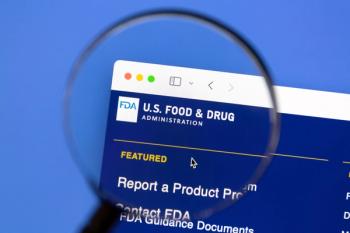
- September 2019 Pain Management
- Volume 85
- Issue 9
Generic Equivalent of EpiPen Jr Launches
The product to treat life-threatening allergies arrives amid the ongoing supply shortage.
Amid the ongoing EpiPen supply shortage, Teva Pharmaceuticals is launching a generic equivalent of EpiPen Jr Auto-Injectors in a 0.15-mg strength in the United States.1
Epinephrine auto-injectors are prescription medicines in a disposable, prefilled automatic injection device, and they are indicated to treat life-threatening allergic emergencies, including anaphylaxis. Anaphylaxis episodes can be caused by allergy injections, biting or stinging insects, exercise, food or medicine allergies, or unknown causes. The auto-injectors do not take the place of professional medical help.1
Epinephrine auto-injectors have maintained their place on the FDA shortage list for more than a year. Australia, Canada, and the United Kingdom have also reported national shortages of EpiPen, the leading brand of epinephrine auto-injectors to treat anaphylaxis, and some countries are out of stock of the junior version.2
Physicians have been encouraged to prescribe alternative brands or generic alternatives where available, but the root of the issue remains unresolved. Mylan, owner of the EpiPen brand, has blamed its manufacturer Meridian Medical Technologies for the shortage,2 and the failure to resolve the issue is frustrating parents and prescribers. According to some reports, families are turning to manual syringes as a cheaper alternative, although it is significantly more complicated to get the correct dose and administer it safely without the auto-injectors.3
Mylan purchased the EpiPen brand in 2007, when the auto-injectors retailed for about $100 for a pack of 2. Since then, the company has risen the price to more than $600, even though manufacturing costs have remained steady at $35 per pen. In response to public outcry, Mylan launched a generic, which retails for $300.2
Several alternatives have entered the market in response to the EpiPen shortage, including Adrenaclick by Amedra, Auvi-Q by Kaleo, and Symjepi by Sandoz. All these options are offered in 0.3-mg doses for patients 66 lb and higher, as well as 0.15 mg for patients weighting 33 to 66 lb.4-6
In August 2018, the FDA approved the first generic version of EpiPen and EpiPen Jr, produced by Teva Pharmaceuticals.7 This generic, priced at $300 for a pack of 2, comes in 2 doses: 0.15 mg for children who weigh 33 to 66 lb and 0.3 mg for children who weigh 66 lb or more.
“We will continue working to ensure availability of both strengths in the United States and plan to accelerate production to meet the urgent need for this medicine,” Brendon O’Grady, executive vice president and head of North America Commercial for Teva Pharmaceuticals, said in a statement.1
Pharmaceutical companies are not the only ones trying to combat the shortage, however. Several states have taken legal action to ensure access for children.
Gov J.B. Pritzker signed a bill in August requiring insurers to cover the costs of epinephrine auto-injectors for children that will take effect January 1, 2020. Federal laws have also attempted to ensure the safe administration of epinephrine auto-injectors by allowing elementary and secondary schools to train personnel to administer the drug to a student in an anaphylactic emergency, although regulations on administration vary by state.8
REFERENCES
- Teva announces availability of a generic equivalent of EpiPen Jr (epinephrine injection, USP) Auto-Injector, 0.15 mg in the United States [news release]. Jerusalem, Israel, and Parsippany, NJ: Teva Pharmaceutical Industries Ltd. tevapharm.com/news/teva_announces_availability_of_a_generic_equivalent_of_epipen_jr_epinephrine_injection_usp_auto_injector_0_15_mg_in_the_united_states_08_19.aspx. Accessed August 21, 2019.
- The EpiPen shortage: how has it come to this? Lancet Child Adolesc Health. 2018;2(12):839. doi: 10.1016/S2352-4642(18)30344-4.
- Swetlitz I. Soaring EpiPen price spurs allergy patients to resort to syringes. STAT website. statnews.com/2016/07/06/epipen-prices-allergies/. Published July 6, 2016. Accessed August 21, 2019.
- Symjepi [prescribing information]. San Diego, CA:Adamis Pharmaceuticals Corp; 2019. dailymed.nlm.nih.gov/dailymed/drugInfo.cfm?setid=b1c6a201-4f23-489f-9fca-f8c82bb- 9fa58&audience=consumer. Accessed August 21, 2019.
- Adrenaclick [prescribing information]. Horsham, PA: Amedra Pharmaceuticals LLC; 2013. adrenaclick.com/pdf/Prescribing-Information.pdf. Accessed August 21, 2019.
- Auvi-Q [prescribing information]. Richmond, VA: kaleo Inc; 2018. dailymed. nlm.nih.gov/dailymed/fda/fdaDrugXsl.cfm?setid=6180fb40-7fca-4602-b3da-ce62b8c- d2470&type=display#JB200. Accessed August 21, 2019.
- Commissioner of the FDA approves first generic version of EpiPen [news release]. Silver Spring MD: FDA; August 16, 2018. www.fda.gov/news-events/press-announce- ments/fda-approves-first-generic-version-epipen. Accessed August 21, 2019.
- Illinois law requires insurance to cover epinephrine auto-injectors for chil- dren. American Health & Safety Institute website. emergencycare.hsi.com/blog/ illinois-law-requires-insurance-cover-epinephrine-auto-injectors-for-children?utm_ medium=social&utm_source=facebook. Published August 20, 2019. Accessed August 21, 2019.
Articles in this issue
over 6 years ago
Keep an Eye on Protein Kinase Inhibitorsover 6 years ago
OTC Focus Case Studies: Painover 6 years ago
What Are the Options for Treating Pain?over 6 years ago
Education, Law Enforcement, and Treatment Programs Are Keyover 6 years ago
Dispensing Mistakes Can Happen to Pets, Tooover 6 years ago
MRPs Are Both a Blessing and a Curseover 6 years ago
Pharmacists Can Provide Optimal Migraine Treatmentsover 6 years ago
Melrose Pharmacy Offers a Unique Feelover 6 years ago
Topical Analgesics Provide Pain Reliefover 6 years ago
Case Studies (September 2019)Newsletter
Stay informed on drug updates, treatment guidelines, and pharmacy practice trends—subscribe to Pharmacy Times for weekly clinical insights.


























